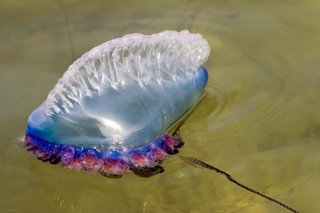Jellyfish and other sea creature stings
What to do if you've been stung
Important: Get help if possible
If you've been stung by a sea creature such as a jellyfish, seek local medical advice as soon as possible. You could ask a lifeguard or someone with first aid training for help.
If help is not available:
Do
-
rinse the affected area with seawater (not fresh water)
-
remove any spines from the skin using tweezers or the edge of a bank card
-
soak the area in very warm water (as hot as can be tolerated) for at least 30 minutes – use hot flannels or towels if you cannot soak it
-
take painkillers like paracetamol or ibuprofen
Don’t
-
do not pee on the sting
-
do not apply ice or a cold pack
-
do not touch any tentacles or spines with your bare hands
-
do not cover or close the wound
Non-urgent advice: Go to a minor injuries unit if:
- you've been stung by a sea creature and you have severe pain that is not going away
- you've been stung by a sea creature on your mouth or throat or near your eyes
- you've been stung by a stingray
- you've been stung by a sea creature in a tropical country
- you have a high temperature or a wound that does not get better after being stung by a sea creature while travelling outside the UK
Immediate action required: Go to A&E or call 999 if:
you've been stung by a sea creature and have:
- difficulty breathing
- chest pain
- fits or seizures
- severe swelling around the affected area
- severe bleeding
- vomiting
- lightheadedness or loss of consciousness
Do not drive to A&E. Ask someone to drive you or call 999 and ask for an ambulance.
Bring any medicines you take with you.
Symptoms of sea creature stings
The main symptoms of sea creature stings are intense pain where you're stung and an itchy rash.
Jellyfish and Portuguese man-of-war stings can also cause raised stripes on the skin (welts).
How to avoid sea creature stings
If you go in the sea there are things you can do to reduce the risk of being stung by a sea creature.
Do
-
look out for beach warning signs
-
consider wearing a wetsuit when swimming in the sea, particularly during the spring and summer
-
wear waterproof shoes or sandals when walking in shallow water or rocky areas
-
scuff or stamp your feet when walking in shallow water to make sea creatures aware you're approaching
Don’t
-
do not touch or handle sea creatures that sting
UK sea creatures that sting

MIKE THEISS/SCIENCE PHOTO LIBRARY https://www.sciencephoto.com/media/365599/view
Page last reviewed: 19 June 2024
Next review due: 19 June 2027